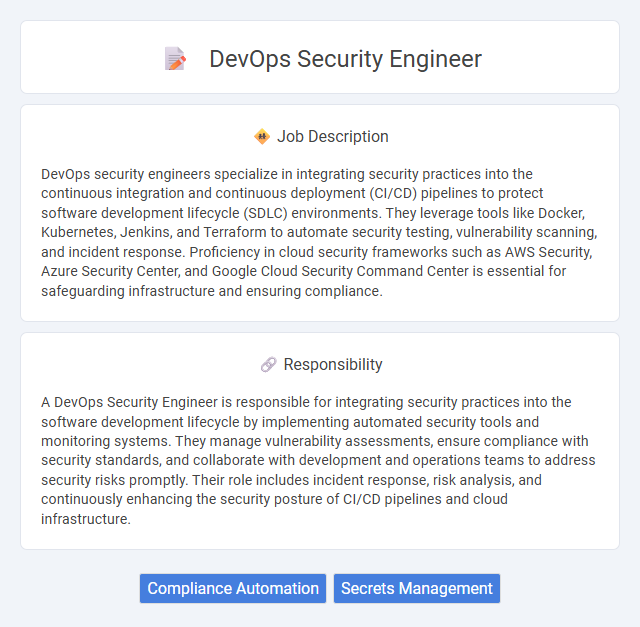
DevOps security engineers specialize in integrating security practices into the continuous integration and continuous deployment (CI/CD) pipelines to protect software development lifecycle (SDLC) environments. They leverage tools like Docker, Kubernetes, Jenkins, and Terraform to automate security testing, vulnerability scanning, and incident response. Proficiency in cloud security frameworks such as AWS Security, Azure Security Center, and Google Cloud Security Command Center is essential for safeguarding infrastructure and ensuring compliance.
Individuals with strong problem-solving skills and a keen attention to detail are likely to be well-suited for a DevOps security engineer role, given the complexity and critical nature of security protocols. Those who enjoy collaborative environments and continuous learning may find this job fitting due to the dynamic interactions between development, operations, and security teams. Candidates who prefer routine tasks or limited technical challenges might not find the role as compatible with their work style.
Qualification
A DevOps security engineer must possess strong expertise in cloud platforms such as AWS, Azure, or Google Cloud, combined with proficiency in containerization tools like Docker and Kubernetes. Deep knowledge of CI/CD pipeline integration, automation scripting (Python, Bash), and security frameworks (NIST, CIS) is essential to safeguard development and operational environments. Certifications such as Certified Kubernetes Security Specialist (CKS), AWS Certified Security Specialty, and CISSP significantly enhance candidate qualifications.
Responsibility
A DevOps Security Engineer is responsible for integrating security practices into the software development lifecycle by implementing automated security tools and monitoring systems. They manage vulnerability assessments, ensure compliance with security standards, and collaborate with development and operations teams to address security risks promptly. Their role includes incident response, risk analysis, and continuously enhancing the security posture of CI/CD pipelines and cloud infrastructure.
Benefit
A DevOps security engineer likely enhances an organization's ability to detect and mitigate security threats early in the development lifecycle, reducing potential risks and vulnerabilities. This role probably improves collaboration between development and operations teams, leading to more secure and reliable software deployments. Emphasizing security automation could result in faster incident response times and consistent compliance with industry regulations.
Challenge
The role of a DevOps security engineer likely involves navigating complex challenges such as integrating robust security measures seamlessly into fast-paced development pipelines. This position probably requires balancing the urgency of continuous delivery with the imperative of maintaining strong security protocols to prevent vulnerabilities. Engineers in this field may frequently encounter the need to anticipate potential threats while automating security practices without disrupting workflow efficiency.
Career Advancement
A DevOps security engineer career advances through mastering cloud security protocols, continuous integration/continuous deployment (CI/CD) pipeline protection, and infrastructure as code (IaC) automation. Expertise in threat modeling, vulnerability assessment, and compliance frameworks such as SOC 2 and ISO 27001 enhances promotion prospects. Leadership roles often require proficiency in incident response, risk management, and strategic security architecture design for scalable DevOps environments.
Key Terms
Compliance Automation
DevOps security engineers specializing in compliance automation design and implement automated workflows to ensure continuous adherence to industry standards such as GDPR, HIPAA, and PCI-DSS. They develop Infrastructure as Code (IaC) policies and integrate security compliance checks into CI/CD pipelines using tools like Terraform, Jenkins, and HashiCorp Vault. Their role enhances risk management by streamlining audit processes and reducing manual intervention in security governance.
Secrets Management
A DevOps security engineer specializing in secrets management ensures the secure handling, storage, and rotation of sensitive credentials across CI/CD pipelines and cloud environments. Expertise in tools like HashiCorp Vault, AWS Secrets Manager, and Azure Key Vault is critical for automating secret lifecycle management and minimizing exposure risks. Implementing robust access controls, audit logging, and encryption protocols significantly enhances overall infrastructure security and compliance posture.
 kuljobs.com
kuljobs.com